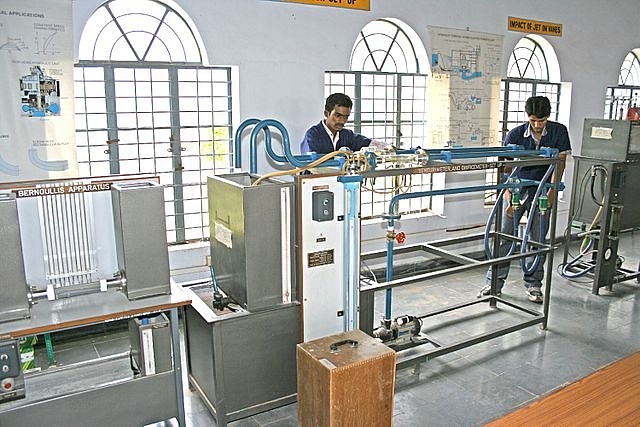Blogs
The Engineering Degree Had A Great Run, But Now It’s Past Its Prime
- The three-year bachelor’s degree is making a comeback as passion for the engineering degree has dwindled over the years.

Students at an electrical and electronics lab (Bharat Institute of Engineering and Technology/Wikimedia Commons)
Enrolment in the three-year undergraduate science programme (Bachelor of Science or BSc) reportedly exceeded that in engineering in the academic year 2015-16. That is the latest year for which data is available with the Human Resource Development Ministry. Enrolment in BSc programs was 42.9 lakh that year, while that in the Bachelor of Technology (BTech) and Bachelor of Engineering (BE) programmes combined was 41.8 lakh.
If we include the honours programmes (BSc Honours), then enrolment in the three-year science programme exceeded that in the four-year engineering programmes in the academic year 2014-15 itself – 44.9 lakh in science, 41.7 lakh in engineering.
Engineering enrolment has remained largely static since 2013-14, when it was 40.1 lakh, while enrolment in the three-year degree programmes (including science, commerce, and arts) has gone up substantially every year.
Why is this change important?
Students were enrolling in engineering programmes in large numbers because of the hope that the resulting degree would offer a better ticket to the good life than would be possible with the three-year programmes. This hope has diminished over time because while around 10 lakh students graduated with an engineering degree every year, only a fraction of that lot secured a job in the engineering sector. Others would mostly remain unemployed, while some lucky ones would get a call up for jobs in call centres or those which were also available to the three-year academic degree holders anyway.
Media hype and coaching centres, however, raised up the prospects of engineering graduates. A single student getting a placement abroad would be a headline not just in the local press but also in the national media. On the other hand, the large number of students from good colleges not getting quality jobs was under-reported.
Even in the heyday of engineering, I would receive numerous applications from graduates of good colleges pleading that I let them work in my group for free since that experience would help them in getting jobs eventually. When I was once conducting an interview for the position of a helper, a BTech graduate in computer science told me that he had applied for the job since it was better than cleaning dishes and sweeping floors at someone’s home.
Based on false hopes, poor people were mortgaging everything they had to ensure their kids went to an engineering college, even though they would have been better off sending their kids off to get the three-year academic degree. Not only were the fees in these colleges much lower, one could save a year of academic expenses in any case. And since everyone was after the coveted engineering degree, one would be in a better position to make it into some relatively better three-year degree colleges on the basis of performance in the Class 12 examinations.
In fact, one would have saved even on coaching class costs, and if one had studied well in Class 12, they would have received higher marks too, making it easier to secure an admission in a good college.
In the last couple of years, people have realised that there are not enough jobs for engineers. One has to have graduated from a good engineering college with a relevant degree to have good prospects. So students are now taking the more rational decision of opting for a regular degree college over a sub-par engineering college. And that is a positive trend.
Introducing ElectionsHQ + 50 Ground Reports Project
The 2024 elections might seem easy to guess, but there are some important questions that shouldn't be missed.
Do freebies still sway voters? Do people prioritise infrastructure when voting? How will Punjab vote?
The answers to these questions provide great insights into where we, as a country, are headed in the years to come.
Swarajya is starting a project with an aim to do 50 solid ground stories and a smart commentary service on WhatsApp, a one-of-a-kind. We'd love your support during this election season.
Click below to contribute.
Latest